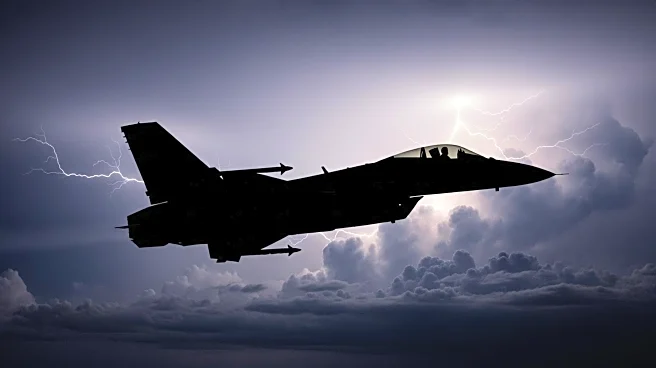What is the story about?
What's Happening?
Estonia has reported a significant breach of its airspace by Russian fighter jets, marking the third such incident involving NATO airspace in recent days. According to Estonian Foreign Minister Margus Tsahkna, three Russian MiG-31 jets entered Estonian airspace for 12 minutes before being forced out by Italian jets. This incursion is seen as a deliberate provocation by Russian leader Vladimir Putin, who is accused of escalating tensions with NATO. Estonia has invoked Article 4 of NATO's treaties, calling for urgent discussions among allies to address the situation. The incident follows similar breaches involving Russian drones in Poland and Romania, highlighting a pattern of increased pressure on NATO's eastern flank.
Why It's Important?
The incursion into Estonian airspace underscores the growing geopolitical tensions between Russia and NATO, particularly in Eastern Europe. Estonia's call for NATO unity and the invocation of Article 4 reflect the seriousness of the threat perceived by member states. This situation could lead to increased military readiness and strategic discussions within NATO, potentially affecting defense policies and international relations. The incident also coincides with new EU sanctions on Russia, indicating a broader strategy to counter Russian aggression. The stakes are high for NATO countries, as they must balance deterrence with diplomatic efforts to prevent further escalation.
What's Next?
In response to the airspace violation, NATO is likely to engage in high-level discussions to assess the situation and determine appropriate measures. These could include increased surveillance, military exercises, or diplomatic initiatives to reinforce NATO's presence in Eastern Europe. The ongoing pattern of Russian provocations may prompt NATO to review its defense strategies and enhance its support for member states on the eastern flank. Additionally, the EU's new sanctions on Russia could lead to further economic and political repercussions, influencing future interactions between Russia and Western nations.
Beyond the Headlines
The repeated breaches of NATO airspace by Russia raise concerns about the long-term stability of the region. These actions may be part of a broader strategy by Russia to test NATO's resolve and unity, potentially exploiting divisions within the alliance. The situation also highlights the importance of international law and the need for effective mechanisms to address violations of sovereignty. As tensions continue, there may be increased scrutiny on defense spending and military capabilities among NATO members, impacting national budgets and policy priorities.

















